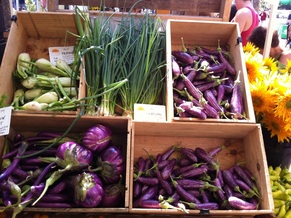
The topic of organic vs. non-organic is one that has been highly discussed and debated by many. Often an off-shoot of this discussion/debate is the idea of buying food grown locally rather than across the country or world. Some believe that it is more imperative to purchase “locally grown” food than organic food. Proponents of buying “locally grown” food say that among the myriad benefits is the decrease in overall travel time whereby the food goes from farm to supermarket shelves. With traditional food, this often includes stops at distribution centers which further lengthens the process. For produce, this often means picking from the tree/vine/ground occurs before peak ripening. Instead, “locally grown”produce is picked when ripe, and goes direct from farm to shelves in a fraction of the time. The result? The freshest food possible.
There is also the perception, held by many, that if food is “locally grown” it does not contain any pesticide or other chemicals. This is not always the case. The label “locally grown” does not promise that the food meets organic criteria.
A point often made by critics of “locally grown” food is that the food is not often as local as consumers may believe it to be. Different stores have different standards that determine what qualifies as “locally grown”. While the consumer may believe the “locally grown” apples they buy come from Davis Family Farm down the road, they may in fact come from a much larger farm potentially several hundred miles away.
What does this all mean? Is “locally grown” food good or bad? Should consumers flock to the nearest farmer’s market or instead stay away? I believe it all to be a matter of personal preference. I absolutely love farmer’s markets and enjoy the experience of going to browse the wares of each vendor. I am always curious to know the origins of the food; is the farm in my zip code, county, or state? Is it a family farm, or a much larger commercial farm? The answers to these questions often come from friendly conversation with the vendors while browsing the selection. As someone who tries to abide by the Dirty Dozen / Clean Fifteen organic produce guidelines, I try to balance the wish to eat organic with supporting “local farmers”.
How about you? Do you buy ”locally grown” food? Why or why not?
There is also the perception, held by many, that if food is “locally grown” it does not contain any pesticide or other chemicals. This is not always the case. The label “locally grown” does not promise that the food meets organic criteria.
A point often made by critics of “locally grown” food is that the food is not often as local as consumers may believe it to be. Different stores have different standards that determine what qualifies as “locally grown”. While the consumer may believe the “locally grown” apples they buy come from Davis Family Farm down the road, they may in fact come from a much larger farm potentially several hundred miles away.
What does this all mean? Is “locally grown” food good or bad? Should consumers flock to the nearest farmer’s market or instead stay away? I believe it all to be a matter of personal preference. I absolutely love farmer’s markets and enjoy the experience of going to browse the wares of each vendor. I am always curious to know the origins of the food; is the farm in my zip code, county, or state? Is it a family farm, or a much larger commercial farm? The answers to these questions often come from friendly conversation with the vendors while browsing the selection. As someone who tries to abide by the Dirty Dozen / Clean Fifteen organic produce guidelines, I try to balance the wish to eat organic with supporting “local farmers”.
How about you? Do you buy ”locally grown” food? Why or why not?


 RSS Feed
RSS Feed